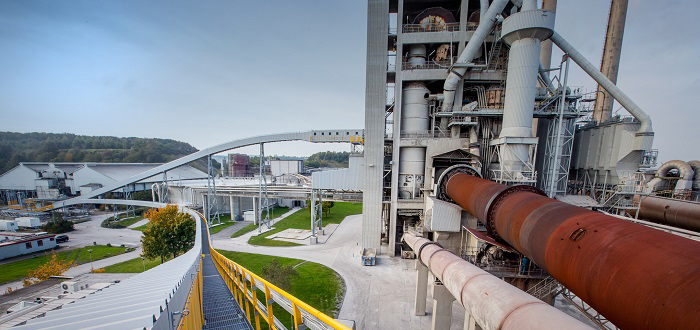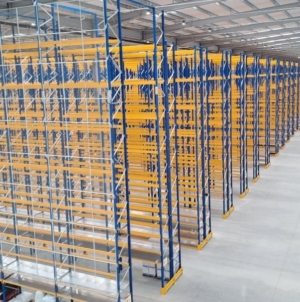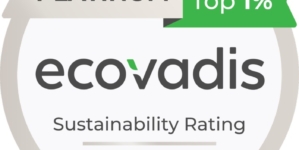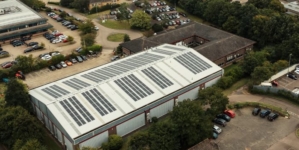-
Nutrivend selects Forterro’s Orderwise to support online expansion and streamline operations - April 11, 2025
-
ARROWXL LAUNCHES AMBITIOUS ZERO WASTE ROADMAP - April 8, 2025
-
THE BCMPA’S NEW CAMPAIGN DRIVES OUTSOURCING SUCCESS IN Q1 - April 7, 2025
-
BLACKOUT TECHNOLOGIES TARGETS TELEMATICS-INTEGRATED MOBILE DEVICE BLOCKING TO COMBAT SMARTPHONE DISTRACTION - April 1, 2025
-
Sparck Technologies awarded Royal designation - March 27, 2025
-
OpenADR Alliance announces first OpenADR 3.0 certified products with EVoke Systems, E.ON Energy and Universal Devices - March 25, 2025
-
Growing fulfilment and contract packer appoints new Managing Director - March 25, 2025
-
When is it time to invest in a WMS? Understanding the key trigger points - March 25, 2025
-
eCapital helps Vantage Recruitment on its journey to financial success - March 24, 2025
-
Hugo Beck Celebrates 70 Years of Packaging Innovation with Open House Events - March 20, 2025
For an economical and sustainable operation, cement manufacturer relies on Beumer.
Cement manufacturer Aalborg Portland A/S relies on the Pipe Conveyor of BEUMER Group:
An economically convincing alternative
The manufacture of cement is particularly energy intensive. For an economical and sustainable operation, Aalborg Portland A/s therefore relies on alternative fuels and raw materials, in its Denmark lead plant, to ignite the calciner and the main burner. BEUMER Group supports the manufacturer with its AFR systems segment (alternative fuels and raw materials) and develops individual single-source solutions in order to efficiently convey, store and feed the differently composed materials. The core of these systems is represented by innovative Pipe Conveyors: The enclosed conveying systems ensure an environmentally safe, dust-free and low-energy transport of fuels and raw materials.
Aalborg Portland is a subsidiary of the Italian cement group Cementir S.p.A. This group of companies is one of the largest and leading manufacturers and exporters of this material world-wide. In addition to the main plant in Aalborg, Denmark, it has further production plants in China, Egypt, Malaysia, Italy, Turkey and the United States of America as well as numerous sales offices.
Secondary fuels instead of primary ones
The production of cement has always been one of the most energy-intensive operations. In order to avoid expensive primary fuels such as carbon, gas and oil, and to produce in more economic and sustainable way, Aalborg Portland has relied on alternative fuels for the incineration process in the calciner for several years.
“In 2014 we decided to optimise and enlarge the existing system”, says Ole Strøm Hansen, project manager of Aalborg Portland. Until then the manufacturer transported the fuels to both calciners through long pneumatic conveying lines. However, the producer did not have an initially positive experience, as pneumatic conveying lines are extremely maintenance-intensive and also susceptible to breakdown. “In addition, we intended to increase the capacity of the existing conveying line to 20 tons per hour per calcinator”, explained Hansen.
With the new concept, the Residue Derived Fuel (RDF) is transported for the calciner and the Solid Recovered Fuel (SRF) to the main burner. The solution is to transport the alternative fuels from the storehouse to the rotary kiln area as well as the gravimetric feed of both the calciner and the main burner.
The decision was made to reduce the length of the pneumatic conveying line and to replace the remaining line by a mechanical transport system, but the manufacturer also wanted to install a completely new conveying line for the main burner feeding, with a capacity of up to ten tons per hour. “We evaluated different variants of mechanical transport systems”, remembers Hansen. Finally, the Danish company opted for a single-source solution of BEUMER Group based on the innovative Pipe Conveyor technology.
Ideal solution for each case
In order to support producers of cement in the alternative fuels and raw materials field, BEUMER Group has set up a complete business segment dedicated to AFR systems. “Our know-how and our tailor-made systems permit us to offer an optimum support to our customers”, says Tomas Hrala, project manager at BEUMER Group. “We have many years of good experience and we always consider customers’ specifications”. With this capability, the system provider is able to supply and install the whole chain from the acceptance and unloading of the delivery vehicle, up to the storing, conveying and feeding process of the solid alternative fuels for the specific user. The customer receives everything from one source, thus having a unique contact.
Pipe Conveyor as hub and pivot
“Due to the different grain sizes and the various compositions of these alternative fuels, it was necessary to develop an individual system solution for each line”, explained Tomas Hrala. To enable the transport of the pre-processed fuels from the storehouse to the calciner and to the main burner, BEUMER Group supplied and installed respectively one Pipe Conveyor as the heart of these systems as well as the accompanying equipments. “This conveying technology is not only eco-friendly and requires low maintenance”, describes Hrala. “Its enclosed type of construction protects the environment safely from material falling down and emissions. Another advantage is the lack of dust development on the running line”. Due to its ability to navigate curves, considerably less transfer towers are required compared to other belt conveyors, allowing for a substantial cost savings to the customer. BEUMER Group can customise each system to the individual routing.
Efficient single-source system
The delivery of the oven-ready material is carried out in moving-floor trailers. The alternative fuels are unloaded and stored at the receiving station. Both lines receive the material/items transported by the moving floors modernised by BEUMER Group from the existing storehouse. All transport systems supplied and the accompanying equipments are intertwined to ensure steady fuel feeding. The Pipe Conveyor of the calciner has a diameter of 350 millimetres, a length of 135 metres and can transport up to 50 tons per hour to an intermediate hopper with a volume of 35 cubic metres. This hopper is equipped with an activator and two double discharge screw conveyors, and distributes the material in two feeding and pneumatic conveying lines to both calciners. The two new pneumatic conveying lines to the calciner with rotary vane feeders and blowers were completely dimensioned and supplied by BEUMER Group.
“However, during the constructive dimensioning of this system we were faced with a particular challenge”, remembers Tomas Hrala, project manager of BEUMER. The buildings in which the calciners are placed include an additional part called penthouse. It supports, among others, the discharge station of the Pipe Conveyor, the intermediate hopper with the two double discharge screw conveyors and also both weigh belt feeders with the pneumatic conveying system. “From a static viewpoint, the penthouse had to be calculated trying to not exceed the available load application in the existing building”, explains Hrala. “At the same time, the subjacent requested throughway for plant vehicles had to be ensured.”
The heart of the line for the main burner is a Pipe Conveyor with a diameter of 200 mm and a length of 201 metres. It achieves a conveying capacity of twelve tons per hour and is equipped with a spillage scraper conveyor for minimising the cleaning, as well as a dedusting filter. The fuel feed of the moving floor in the storehouse to the Pipe Conveyor is carried out by a screw conveyor. The feeding system in the main burner building includes an intermediate hopper with a volume of ten cubic metres, also with activator and double discharge screw conveyor and a weigh belt feeder. In addition, there is a pneumatic conveying line with blower and rotary vane feeder.
“We are very pleased with both single-source systems”, Ole Strøm Hansen of Aalborg Portland sums up. “The transport systems and the accompanying equipments are intertwined to ensure steady fuel feeding.” Tomas Hrala continues, emphasising BEUMER Group’s role: “We could again demonstrate that we have substantial competence with regard to the handling of alternative fuels in the cement industry and that we can support our customers efficiently.”
































